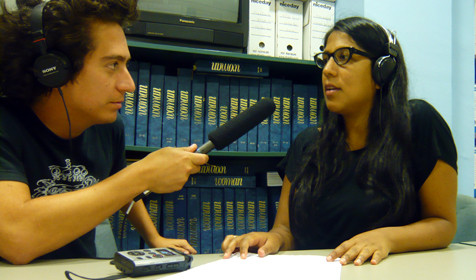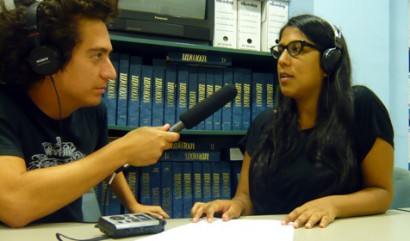Radio Ambulante has high aspirations: to revolutionize Spanish-language radio in the U.S. and throughout the Spanish- speaking world.
Instead of the pop-songs, evangelists and sports that dominate the airwaves en español, Radio Ambulante (roughly translated as “radio on the move”) will tell sound rich first-person stories from Latin America and Hispanic communities in the US. Think This American Life, in Spanish.
The project is in the pilot stage—you can listen to a few stories on their website while they finalize their first three podcast episodes and raise funds to ultimately broadcast on radio stations in Latin American and the U.S. The pieces include an emotional story about the fall of the legendary Argentine soccer team, River Plate; a piece about migrating from Europe back to South America; and a story about one boy’s trials upon arriving to the U.S., and being sent straight to the belly of the beast: the high school cafeteria.
The team behind Radio Ambulante includes novelist Daniel Alarcón, entrepreneur Carolina Guerrero, journalist Annie Correal, and radio producer Martina Castro. Daniel and Annie came on the Fi2W podcast to give us a sneak peak of what the program will sound like, and tell us about their goals for the project.
Listen:
https://feetintwoworlds.podbean.com/e/fi2w-podcast-radio-ambulante/
Subscribe to the Fi2W Podcast with iTunes or Podbean
Daniel Alarcón writes about the origins of Radio Ambulante:
I first got the idea for Radio Ambulante back in 2007, when the BBC asked me to host a radio documentary about Andean migration to Lima. They sent a producer from London, Gavin Heard, who took care of all the recording, and who was always there with a insightful, nuanced question to help me shape the story. It was an incredible learning experience, but when the final piece was edited I found myself just a little frustrated. I noticed that some of the most interesting voices hadn’t made the cut—they’d given way to other voices, in English. While I understood this as an aesthetic, editorial decision, I couldn’t help but wonder what might be done with rest of the tape, those Spanish speakers. I wished there was a place for them.
As is the case with a lot of ideas, this one sat on the shelf for many years. Then, it so happened that I mentioned it to my wife one day while we were sitting at a coffee shop in San Francisco. We were talking about projects we wanted to do, and Carolina’s eyes just sort of lit up. I think she got it right away, but we knew nothing about radio, and so we spent the first few months learning everything we could about this world. We spent a lot of time on websites like Transom, and reading radio blogs, and calling people we knew to ask for advice. It was a lot of work, but it was mostly very exciting.
And it’s even more exciting to think about where Radio Ambulante is headed. We’ll start by focusing on the quality of each piece, each episode; this is our core mission. Everything else—including what we expect will eventually be a large, transnational audience online and on the air—will depend first on the quality of the stories we produce. So many of the people whom we spoke to about our project would say things like: “This American Life in Spanish—that doesn’t exist already?” They were incredulous, and, to a certain extent, we were as well. As we envisioned the kind of program we wanted to create, we did our homework, and found that there was nothing quite like Radio Ambulante out there. This means we have a great opportunity, and a great responsibility. We think this is the right moment to create a show like ours: one that implicitly challenges borders, tells compelling human stories, and uses all available technologies—from podcasts to terrestrial radio—to build a community of listeners. I have a lot of ideas and a lot of energy, and I honestly can’t wait to see how it all develops.
If you’re a fan of what you hear, you might consider contributing to Radio Ambulante’s Kickstarter campaign.
Feet in Two Worlds is supported by the New York Community Trust and the John S. and James L. Knight Foundation with additional support from the Mertz Gilmore Foundation. Fi2W podcasts are supported in part by WNYC Radio and the CUNY Graduate School of Journalism.





